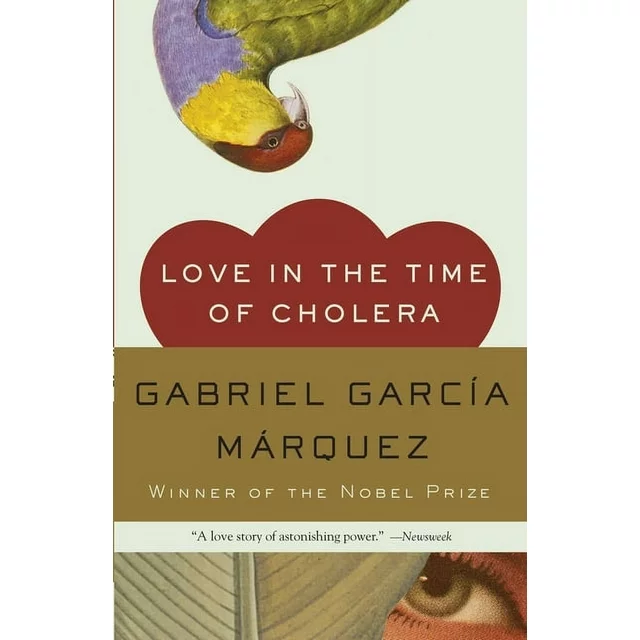It took me three tries to get into Love in the Time of Cholera before I got over the hump and into the flow of the writing. Although I struggled at first getting into the story, it was worth the repeated effort.
Gabriel Garcia Marquez is one of the most exquisite writers I’ve ever encountered. His unique way of looking at the world and describing the mundane day-to-day takes on a magical quality.
Once I delved deeper into the narrative of Love in the Time of Cholera, I was drawn into a world where love knows no boundaries and time seems to bend under the weight of passion.

His characters are so strange and delightfully (or frustratingly) quirky that they seem like they have to be real. In this classic novel, Marquez weaves a tale that lingers long after the final page.
So, if you find yourself hesitant at first, as I was, take the leap and immerse yourself in this book’s enthralling world through these quotes from Love in the Time of Cholera; it’s a journey well worth the initial struggle.
34 Top Quotes from Love in the Time of Cholera by Gabriel Garcia Marquez (with page numbers)
Quotes from Love in the Time of Cholera
1. “IT WAS INEVITABLE: the scent of bitter almonds always reminded him of the fate of unrequited love.” (pg. 1. The first sentence of the book)
2. “Although the air coming through the window had purified the atmosphere, there still remained for the one who could identify it the dying embers of hapless love in the bitter almonds.” (pg. 1)
3. “Each man is master of his own death, and all that we can do when the time comes is to help him die without fear of pain.” (pg. 8)
4. “Dr. Urbino, prepared for a confidential visit, realized too late that there was no innocence more dangerous than the innocence of age.” (pg. 11)
5. “Neither could have said if their mutual dependence was based on love or convenience, but they had never asked the question with their hands on their hearts because both had always preferred not to know the answer.” (pg. 24)
6. “But if they had learned anything together, it was that wisdom comes to us when it can no longer do any good.” (pg. 25)
7. “There was no sleeper more elegant than she, with her curved body posed for a dance and her hand across her forehead, but there was also no one more ferocious when anyone disturbed the sensuality of her thinking she was still asleep when she no longer was.” (pg. 25)
8. “…if he did all he could to keep those threads intact, it was because of his terror of not finding God in the darkness of death.” (pg. 39)
9. “She prayed to God to give him at least a moment so that he would not go without knowing how much she had loved him despite all their doubts, and she felt an irresistible longing to begin life with him over again so that they could say what they had left unsaid and do everything right that they had done badly in the past.” (pg. 45)
10. “Until that moment she had never been fully conscious of the weight and size of the drama that she had provoked when she was not yet eighteen, and that would pursue her until her death.” (pg. 49)
11. “…that casual glance was the beginning of a cataclysm of love that still had not ended half a century later.” (pg. 52)

12. “All that was needed was shrewd questioning, first of the patient and then of his mother, to conclude once again that the symptoms of love were the same as those of cholera.” (pg. 58)
13. “It was the year they fell into devastating love. Neither one could do anything except think about the other, dream about the other, and wait for letters with the same impatience they felt when they answered them.” (pg. 65)
14. “In reality they were distracted letters, intended to keep the coals alive without putting her hand in the fire, while Florentino Ariza burned himself alive in every line.” (pg. 66)
15. “Tell him yes,” she said. “Even if you are dying of fear, even if you are sorry later, because whatever you do, you will be sorry all the rest of your life if you say no.” (pg. 68)
16. “Very well, I will marry you if you promise not to make me eat eggplant.” (pg. 68)
17. “…he read whatever came his way, as if it had been ordained by fate, and despite his many years of reading, he still could not judge what was good and what was not in all that he had read.” (pg 72)
18. “He was still too young to know that the heart’s memory eliminates the bad and magnifies the good, and that thanks to this artifice we manage to endure the burden of the past.” (pg. 101)
19. “…one comes into the world with a predetermined allotment of lays, and whoever does not use them for whatever reason, one’s own or someone else’s, willingly or unwillingly, loses them forever.” (pg. 147)
20. “…everything about her was distinctive and confident, as if it had been hers from birth. He found her more beautiful and youthful than ever, but more lost to him than she had ever been…” (pg. 149)
21. “Dr. Juvenal Urbino was surprised that his young wife did not pray before going to sleep. She was frank with him: the duplicity of the nuns had provoked in her a certain resistance to rituals, but her faith was intact, and she had learned to maintain it in silence. She said: “I prefer direct communication with God.” (pg. 152)
22. “…her wise decision was to buy her fill of what she liked best in the secondhand shops, although her husband swore in dismay that it was corpses’ clothing. In the same way she brought back quantities of Italian shoes without brand names, which she preferred to the renowned and famous shoes by Ferry, and she brought back a parasol from Dupuy, as red as the fires of hell, which gave our alarmed social chroniclers much to write about.” (pg. 157)
23. “No, not rich,” he said. “I am a poor man with money, which is not the same thing.” (pg. 161)
24. “He drank black coffee at any hour, anywhere, under any circumstances, as many as thirty little cups a day: a brew like crude oil which he preferred to prepare himself and which he always kept near at hand in a thermos.” (pg. 167)
25. “He was another person, despite his firm decision and anguished efforts to continue to be the same man he had been before his mortal encounter with love.” (pg. 167)
26. “…she discovered with great delight that one does not love one’s children just because they are one’s children but because of the friendship formed while raising them.” (pg. 202)
27. “Life in the world, which had caused her so much uncertainty before she was familiar with it, was nothing more than a system of atavistic contracts, banal ceremonies, preordained words, with which people entertained each other in society in order not to commit murder.” (pg. 206)
28. “…she would always remember Paris as the most beautiful city in the world, not because of what it was or was not in reality, but because it was linked to the memory of her happiest years.” (pg. 207)
29. “He could not avoid it: whenever he found himself on the edge of catastrophe, he needed the help of a woman.” (pg. 279)
30. “The night was over, for he did not dare to play forbidden games with a woman who had proven too many times that she knew the dark side of the moon.” (pg. 283)
31. “She needed to be somewhat intoxicated in order not to think about her fate with too much lucidity” (pg. 335)
32. “For they had lived together long enough to know that love was always love, anytime and anyplace, but it was more solid the closer it came to death.” (pg. 342)
33. “From the moment I was born,” said Florentino Ariza, “I have never said anything I did not mean.” (pg. 345)
34. “it is life, more than death, that has no limits.” (pg. 345)
Related Quotes:
Top Quotes from Love in the Time of Cholera